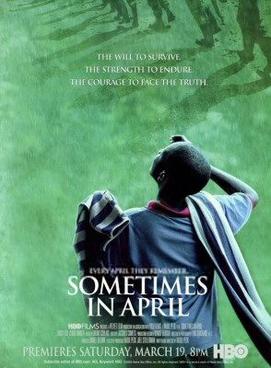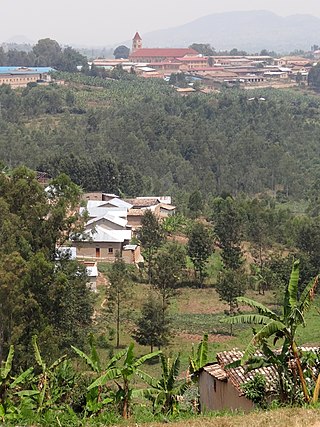Related Research Articles

The Rwandan genocide, also known as the genocide against the Tutsi, occurred between 7 April and 19 July 1994 during the Rwandan Civil War. During this period of around 100 days, members of the Tutsi minority ethnic group, as well as some moderate Hutu and Twa, were killed by armed Hutu militias. Although the Constitution of Rwanda states that more than 1 million people perished in the genocide, the actual number of fatalities is unclear, and some estimates suggest that the real number killed was likely lower. The most widely accepted scholarly estimates are around 500,000 to 800,000 Tutsi deaths.

This is a bibliography for primary sources, books and articles on the personal and general accounts, and the accountabilities, of the 1994 Rwandan genocide.
The Gacaca courts were a system of transitional justice in Rwanda following the 1994 genocide. The term 'gacaca' can be translated as 'short grass' referring to the public space where neighborhood male elders (abagabo) used to meet to solve local problems. The name of this system was then adopted in 2001 as the title of the state's new criminal justice system "Gacaca Courts" to try those deemed responsible for the 1994 Rwandan genocide where over an estimated 800,000 people were killed, tortured and raped. In 1994, the United Nations Security Council created the International Criminal Tribunal for Rwanda to try high-ranking government and army officials accused of genocide, war crimes, and crimes against humanity. The Gacaca Courts were established in law in 2001, began to operate on a trial basis in 2002 and eventually came to operate as trials throughout the country by early 2007. The Gacaca courts were presented as a method of transitional justice, claimed by the Rwandan government to promote communal healing and rebuilding in the wake of the Rwandan Genocide. Rwanda has especially focused on community rebuilding placing justice in the hands of trusted citizens.

Sometimes in April is a 2005 American made-for-television historical drama film about the 1994 Rwandan Genocide, written and directed by the Haitian filmmaker Raoul Peck. The ensemble cast includes Idris Elba, Oris Erhuero, Carole Karemera, and Debra Winger.
Survivors Fund (SURF), founded in 1997, represents and supports survivors of the Genocide against the Tutsi in Rwanda in Rwanda. It is the principal international charity with a specific remit to assist survivors of the Genocide against the Tutsi in Rwanda, and has offices in London and Kigali. It is registered with the Charity Commission for England & Wales.
Flower in the Gun Barrel is a 2008 documentary film focusing on the process of reconciliation and forgiveness in post-genocide Rwanda. The film depicts both the current conditions in Rwanda and the buildup to the genocide in 1994. It is unique in that it illustrates the complex challenges of average citizens attempting to forgive the neighbors who slaughtered their families. It is a testament to what human beings are capable of. The topic of forgiveness, and the difficulty of coming to terms with those who have killed one's parents, siblings, children and neighbors, is a universal theme that comes to life through the example of Rwanda.

Génocidaires are Rwandans who are guilty of genocide due to their involvement in the mass killings which were perpetrated in Rwanda during the 1994 genocide against the Tutsi, in which 800,000 Rwandans, primarily Tutsis and moderate Hutu, were murdered by the Interahamwe. In the aftermath of the genocide, Rwandans who organized and led the genocide were put on trial at the International Criminal Tribunal for Rwanda. Those guilty of lesser crimes, such as participation, profiting through seizing Tutsi property, and the like, were put on trial in gacaca courts. Today, the ICTR has indicted over ninety-three people for genocide. In 2020, Félicien Kabuga, the main financier of the Rwandan Genocide, was found in suburban France after evading capture for over twenty-six years.
Anne Aghion is a French-American documentary filmmaker. She is a Guggenheim Fellow, a Mac Dowell Colony Fellow and a Rockefeller Foundation Bellagio Center Fellow.

In Rwanda We Say…The Family That Does Not Speak Dies is a documentary film examining the Gacaca justice process in the aftermath of the Rwandan genocide against the Tutsi in 1994. Directed by Anne Aghion and produced by Gacaca Productions, this 2004 film won an Emmy Award for "Outstanding Informational Programming." Filmed in Rwanda, the language of In Rwanda is Kinyarwanda with English subtitles.

Gacaca, Living Together Again In Rwanda? is the first documentary film in a trilogy by Anne Aghion examining the aftermath of the Rwandan genocide. Directed by Anne Aghion and produced by Dominant 7, Gacaca Productions, and Planète, this 2002 film won UNESCO's Fellini Prize. Filmed in Rwanda, the language of Gacaca is Kinyarwanda with English subtitles. In Kinyarwanda, gacaca means "grass", which was the location of the reparation trials in Rwanda.

My Neighbor, My Killer is a 2009 French-American documentary film directed by Anne Aghion that focuses on the process of the Gacaca courts, a citizen-based justice system that was put into place in Rwanda after the 1994 genocide. Filmed over ten years, it makes us reflect on how people can live together after such a traumatic experience. Through the story and the words of the inhabitants of a small rural community, we see survivors and killers learn how to coexist.
Rwandan genocide denial is the pseudohistorical assertion that the Rwandan genocide did not occur, specifically rejection of the scholarly consensus that Rwandan Tutsis were the victims of genocide between 7 April and 19 July 1994. The perpetrators, a small minority of other Hutu, and a fringe of Western writers dispute that reality.

Kabgayi is just south of Gitarama in Muhanga District, Southern Province, Rwanda, 25 miles (40 km) southwest of Kigali. It was established as a Catholic Church mission in 1905. It became the center for the Roman Catholic Church in Rwanda and is the site of the oldest cathedral in the country and of Catholic seminaries, schools and a hospital. The church at first supported the Tutsi ruling elite, but later backed the Hutu majority. During the 1994 Rwandan genocide thousands of Tutsis who had taken refuge here were killed. Some survivors admire the courage of many priests who helped them during those difficult days, like Father Evergiste RUKEBESHA and many others. Later, some Hutus including three bishops and many priests were killed by the rebels RPF soldiers. A mass grave beside the hospital is marked by a memorial. Inside the Basilica are kept the bodies of the three bishops killed by FPR rebels. Two of them were refused by the Rwandan government to be transferred in their own cathedrals.
Anne Karoline Frogner is a Norwegian filmmaker, photographer, writer and lecturer. She is one of Norway's foremost documentary filmmakers and is a stills photographer for the image agency Samfoto. She is the director of production company Integritet Film AS and the author of several books.

Sweet Dreams is a 2012 documentary film about the Rwandan women's drumming troupe Ingoma Nshya, which was founded in 2005 by playwright Odile "Kiki" Katese with women from both sides of the 1994 Rwandan genocide. The drumming troupe's success then led to the opening of an ice cream store in 2010, which also brings together people from both sides of the genocide. The documentary was co-directed by siblings Lisa Fruchtman and Rob Fruchtman; Lisa Fruchtman had learned of the troupe and the plans for the shop from Katese in 2009.
In 1999, Rwanda began its National Unity and Reconciliation Commission (NURC) in order to work towards a reconciliation of the conflicting parties involved in the Rwandan Civil War and the Rwandan genocide, with the eventual goal of reunifying the country’s citizens. The passage of the Government of National Unity Law No. 03/99 provided for the establishment of the National Unity and Reconciliation Commission, which became a permanent body in 2002, and continues its function to the present day. As its name suggests, the Commission is intended to promote unity and reconciliation amongst the former opponents present in the Rwandan population.
Tatiana Mukakibibi is a former journalist and radio presenter in Rwanda.
Rwanda: The Untold Story is a 2014 documentary film by the British Broadcasting Corporation that was broadcast on BBC2 at prime-time on 1 October 2014.
Yvonne Ntacyobatabara Basebya was a Rwandan-Dutch woman who was the first Dutch citizen to be convicted of incitement to genocide, in relation to the Rwandan genocide of 1994.
References
- ↑ "The Notebooks of Memory: Documentary Film on Gacaca" . Retrieved 2010-03-08.
- ↑ "The Notebooks of Memory: Documentary Film on Gacaca" . Retrieved 2010-03-08.